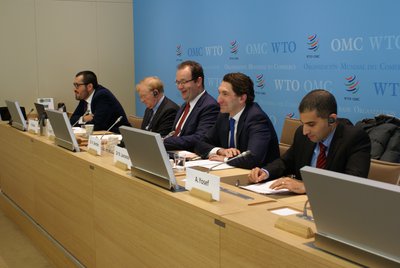15 Mar 2017
WTI co-organises first ‘Trade Lecture’ at WTO
‘Bilateral and plurilateral agreements: Supporting or challenging the WTO?’ was the title of the first in the ‘Trade Lecture Series’ co-organised by the WTI and the Israeli Mission to the World Trade Organization, and held at the WTO in Geneva on 9 March.
The event, attended by around 80 people, featured presentations by WTI Director of Outreach Koen Berden and former Managing Director Thomas Cottier. A panel session was moderated by Rodolfo Rivas, Senior Counsellor of Israel to the WTO and included Nikos Lavranos, a legal advisor on investment law and arbitration, and Asi Yosef, Deputy Permanent Representative of Israel to the WTO as panellists.
In his presentation on legal cross-pollination between FTAs, plurilaterals and the multilateral trading system, Professor Cottier pointed to the huge growth in cross-regional and intra-regional preferential trade agreements over the past 50 years. More than 700 such PTAs have been mapped by the WTI DESTA database. Trade between PTA members is growing as the number of agreements increases.
The shift towards PTAs was partly caused by rigidity in WTO talks, Prof. Cottier said. He concluded there was a need for an integrated approach to trade regulation, moving towards a common law of international trade.
Koen Berden then presented the economic perspective, highlighting trends that include regional production networks and global value chains and the increased importance of non-tariff measures (NTMs). The DESTA database showed not only the growth in the number of PTAs but also their increased depth, with the inclusion of new elements. The US, EU, Japan and Canada are most represented in mega-regional agreements, with Russia and China mainly absent. Developing countries are also mainly missing from these agreements, Dr Berden said.
For the WTO some of these mega-regionals and plurilaterals could set new precedents that matter economically, he said, including in the areas of regulatory cooperation and convergence and sustainable development. There could also be positive, and negative spill-over effects for third countries, such as Switzerland.
Dispute settlement
Nikos Lavranos in his paper made a call for integrating investor-state disputes within the WTO, echoing comments by Prof. Cottier.
He said the WTO dispute settlement system was robust with a good legal secretariat and much experience. The various WTO agreements already now touch on investment, and indeed, there is a logical link between trade and investment, which should also extend to dispute settlement.
Although the European Commission could have chosen to develop a system identical with the WTO Dispute Settlement Understanding (DSU) or at least one that could easily be integrated into the WTO, it had instead decided to create a new body with different rules and structure. In the short term, the integration of the investment disputes into the WTO – while very desirable and economically efficient – seems unlikely and difficult to realise, Dr Lavranos said.
He concluded that it would seem much better to use the existing WTO DSU as a starting point for creating a multilateral investment court by modifying and extending the current rules. This also had the advantage of making use of the existing knowledge and experience within the WTO.
The Israeli experience
For his part, Asi Yosef presented a case study on Israel’s experience with bilateral, plurilateral and multilateral agreements. This included seven bilateral and multilaterals agreements between 1975 and 2000, only three in the following decade, and five since 2010.
Multilateral agreements complemented rather than supported or challenged the WTO system, he said. Some disciplines from bilateral agreements were used in WTO negotiating texts and vice versa.
Future lectures in the series will involve other top universities in the field, including Stanford Law School and Columbia Law School.
Further info
Prof. Cottier's presentation
Dr Berden's presentation
Event Photos


